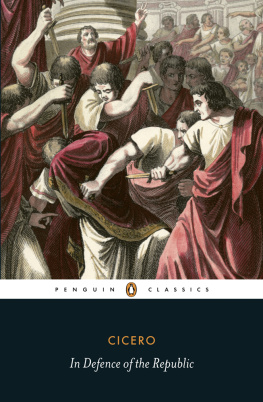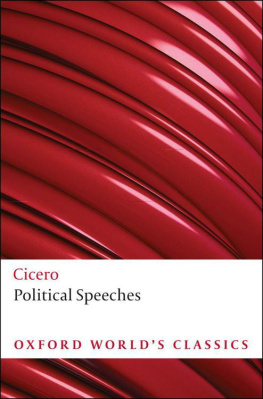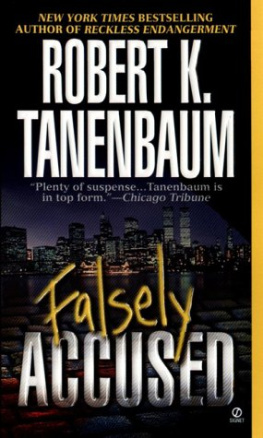OXFORD WORLDS CLASSICS
DEFENCE SPEECHES
MARCUS TULLIUS CICERO (10643 BC) was the son of a Roman eques from Arpinum, some 70 miles (112 km.) south-east of Rome. He rose to prominence through his skill in speaking and his exceptional success in the criminal courts, where he usually spoke for the defence. Although from a family that had never produced a Roman senator, he secured election to all the major political offices at the earliest age permitted by law. His consulship fell in a year (63) in which a dangerous insurrection occurred, the Catilinarian conspiracy; by his persuasive oratory and his controversial execution of five confessed conspirators, he prevented the conspiracy from breaking out at Rome and was hailed as the father of his country. Exiled for the executions by his enemy Clodius in 58 but recalled the following year, he lost his political independence as a result of the domination of politics by the military dynasts Pompey and Caesar. His governorship of Cilicia (5150) was exemplary in its honesty and fairness. Always a firm republican, he reluctantly supported Pompey in the Civil War, but was pardoned by Caesar. He was not let into the plot against Caesar, but was in a sense its inspiration, being seen by now as a symbol of the republic. After Caesars assassination (44), he supported the young Octavian (the future emperor Augustus) and led the senate in its operations against Mark Antony. When Octavian and Antony formed the second triumvirate with Lepidus in 43, Cicero was their most prominent victim; he met his end with great courage.
Ciceros speeches are models of eloquence and persuasion; and together with his letters they form the chief source for the history of the late republic. His philosophical treatises, written in periods when he was deprived of his political freedom, are the main vehicle by which Hellenistic philosophy was transmitted to the west. His prose style raised the Latin language to an elegance and beauty that was never surpassed.
D. H. BERRY is Lecturer in Classics at the University of Leeds. He has published an edition of and commentary on Ciceros Pro Sulla (Cambridge Classical Texts and Commentaries, 1996) and a revision of M. L. Clarkes Rhetoric at Rome (Routledge, 1996). A companion volume to this book, Political Speeches, is forthcoming. He lives in Leeds and the Scottish Borders.
OXFORD WORLDS CLASSICS
For over 100 years Oxford Worlds Classics have brought readers closer to the worlds great literature. Now with over 700 titlesfrom the 4,000-year-old myths of Mesopotamia to the twentieth centurys greatest novelsthe series makes available lesser-known as well as celebrated writing.
The pocket-sized hardbacks of the early years contained introductions by Virginia Woolf, T. S. Eliot, Graham Greene, and other literary figures which enriched the experience of reading. Today the series is recognized for its fine scholarship and reliability in texts that span world literature, drama and poetry, religion, philosophy and politics. Each edition includes perceptive commentary and essential background information to meet the changing needs of readers.
Refer to the to navigate through the material in this Oxford Worlds Classics ebook. Use the asterisks (*) throughout the text to access the hyperlinked Explanatory Notes.
OXFORD WORLDS CLASSICS

CICERO
Defence Speeches

Translated with Introductions and Notes by
D. H. BERRY


Great Clarendon Street, Oxford OX2 6DP
Oxford University Press is a department of the University of Oxford.
It furthers the Universitys objective of excellence in research, scholarship,
and education by publishing worldwide in
Oxford New York
Athens Auckland Bangkok Bogot Buenos Aires Calcutta
Cape Town Chennai Dar es Salaam Delhi Florence Hong Kong Istanbul
Karachi Kuala Lumpur Madrid Melbourne Mexico City Mumbai
Nairobi Paris So Paulo Shanghai Singapore Taipei Tokyo Toronto Warsaw
with associated companies in Berlin Ibadan
Oxford is a registered trade mark of Oxford University Press
in the UK and in certain other countries
Published in the United States
by Oxford University Press Inc., New York
D. H. Berry 2000
Database right Oxford University Press (maker)
First published as an Oxford Worlds Classics paperback 2000
All rights reserved. No part of this publication may be reproduced, stored in a retrieval system, or transmitted, in any form or by any means, without the prior permission in writing of Oxford University Press, or as expressly permitted by law, or under terms agreed with the appropriate reprographics rights organizations. Enquiries concerning reproduction outside the scope of the above should be sent to the Rights Department, Oxford University Press, at the address above
You must not circulate this book in any other binding or cover
and you must impose this same condition on any acquirer
British Library Cataloguing in Publication Data
Data available
Library of Congress Cataloging in Publication Data
Cicero, Marcus Tullius.
Defence speeches/Cicero; translated with introduction and notes by D. H. Berry.
(Oxford worlds classics)
Includes bibliographical references.
1. Cicero, Marcus TulliusTranslations into English. 2. Speeches, addresses, etc.,
LatinTranslations into English. 3. Defense (Criminal procedure)RomeSources. I.
Berry, D. H. II. Title. III. Oxford worlds classics (Oxford University Press)
PA6307.A4 B47 2001 875.01dc21 00040632
ISBN 0192825127
1 3 5 7 9 10 8 6 4 2
Typeset in Ehrhardt
by RefineCatch Limited, Bungay, Suffolk
Printed in Great Britain on
acid-free paper by
Cox & Wyman Ltd.
Reading, Berkshire
To Courtenay and Sarah Latimer,
and to the memory of my mother
CONTENTS
ACKNOWLEDGEMENTS
I AM grateful to Professor Jonathan Powell and two anonymous readers for their comments on my translation of Pro Archia.
Special thanks to Douglas Cairns, Ian Gibson, Sunit Jilla, Paul Knox, Elizabeth Pender, and Perry Savill for their help and friendship during the writing of this book. Friends, like manuscripts, should be weighed not counted.
ABBREVIATIONS
Cic. Arch. | Cicero, Pro Archia |
Att. | Epistulae ad Atticum |
Brut. | Brutus |
Cael. | Pro Caelio |
Fam. | Epistulae ad familiares |
Man. | Pro lege Manilia |
Mil. | Pro Milone |
Mur. | Pro Murena |
Orat. | Orator |
Phil. | Orationes Philippicae (Philippics) |
Planc. | Pro Plancio |
Sest |
Next page









